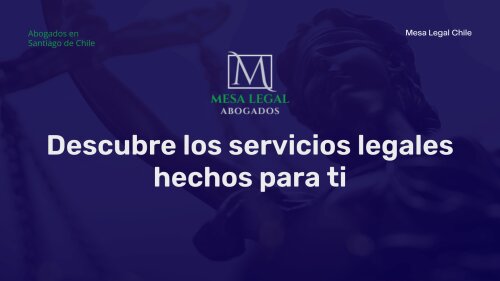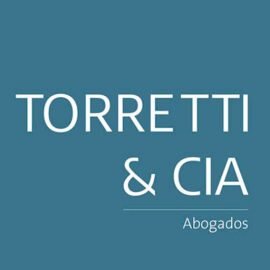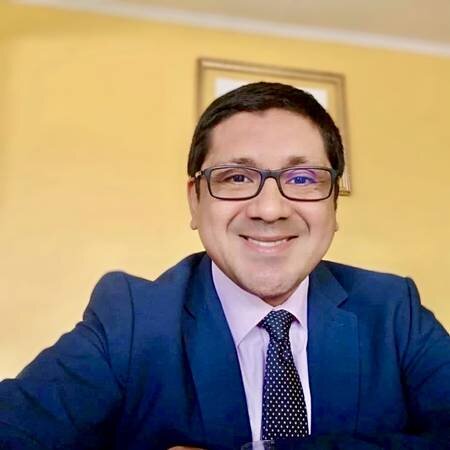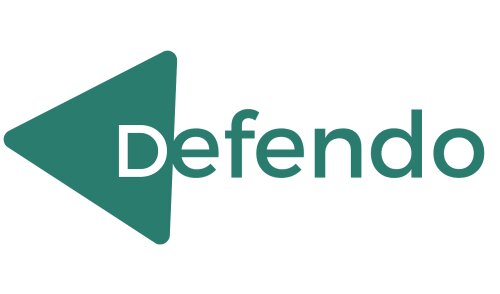Best Probate Lawyers in Chile
Share your needs with us, get contacted by law firms.
Free. Takes 2 min.
Or refine your search by selecting a city:
List of the best lawyers in Chile
About Probate Law in Chile
Probate is the legal process through which a deceased person's assets are distributed to their beneficiaries and heirs. In Chile, Probate is governed by the Civil Code and is overseen by a court. It is important to follow the proper procedure to ensure the smooth transfer of assets and to avoid any disputes among family members.
Why You May Need a Lawyer
You may need a lawyer in Probate situations if there are complex assets involved, disputes among family members, or if you are unfamiliar with the legal process. A lawyer can provide guidance, ensure that all legal requirements are met, and represent your interests in court if necessary.
Local Laws Overview
In Chile, Probate laws dictate that the deceased person's assets must be distributed according to their will or, if there is no will, according to the law of intestacy. The court will appoint an executor to oversee the distribution of assets and resolve any disputes that may arise. It is important to file the necessary paperwork and comply with all legal requirements to avoid delays in the distribution of assets.
Frequently Asked Questions
1. What is Probate in Chile?
In Chile, Probate is the legal process through which a deceased person's assets are distributed to their beneficiaries and heirs according to their will or the law of intestacy.
2. Do I need a lawyer for Probate in Chile?
While you are not required to have a lawyer for Probate in Chile, it is highly recommended, especially if there are complex assets or disputes among family members.
3. How long does Probate take in Chile?
The duration of Probate in Chile varies depending on the complexity of the case and any disputes that may arise. It can take several months to several years to complete the process.
4. What does an executor do in Probate?
An executor is responsible for overseeing the distribution of the deceased person's assets, paying off debts and taxes, and resolving any disputes that may arise among beneficiaries.
5. What happens if there is no will in Chile?
If there is no will in Chile, the deceased person's assets will be distributed according to the law of intestacy, which specifies the order of inheritance among family members.
6. Can Probate be contested in Chile?
Yes, Probate can be contested in Chile if there are valid reasons to believe that the distribution of assets is not in accordance with the deceased person's wishes or the law.
7. What are the costs associated with Probate in Chile?
The costs of Probate in Chile include court fees, lawyer fees, and any other expenses that may arise during the process. These costs can vary depending on the complexity of the case.
8. Can I avoid Probate in Chile?
While it is not possible to completely avoid Probate in Chile, you can help streamline the process by having a clear and updated will, organizing your assets, and consulting with a lawyer to ensure that all legal requirements are met.
9. What happens to debts in Probate in Chile?
In Probate in Chile, the deceased person's debts must be paid off before the assets can be distributed to beneficiaries. The executor is responsible for managing the payment of debts.
10. How can I find a probate lawyer in Chile?
You can find a probate lawyer in Chile by asking for recommendations from friends or family, searching online for reputable law firms, or contacting the local bar association for a referral.
Additional Resources
For additional resources on Probate in Chile, you may consider contacting the Ministry of Justice, the Chilean Bar Association, or local law firms specializing in Probate law.
Next Steps
If you require legal assistance in Probate in Chile, it is recommended to consult with a qualified probate lawyer who can guide you through the process, ensure that all legal requirements are met, and represent your interests in court if necessary.
Lawzana helps you find the best lawyers and law firms in Chile through a curated and pre-screened list of qualified legal professionals. Our platform offers rankings and detailed profiles of attorneys and law firms, allowing you to compare based on practice areas, including Probate, experience, and client feedback.
Each profile includes a description of the firm's areas of practice, client reviews, team members and partners, year of establishment, spoken languages, office locations, contact information, social media presence, and any published articles or resources. Most firms on our platform speak English and are experienced in both local and international legal matters.
Get a quote from top-rated law firms in Chile — quickly, securely, and without unnecessary hassle.
Disclaimer:
The information provided on this page is for general informational purposes only and does not constitute legal advice. While we strive to ensure the accuracy and relevance of the content, legal information may change over time, and interpretations of the law can vary. You should always consult with a qualified legal professional for advice specific to your situation.
We disclaim all liability for actions taken or not taken based on the content of this page. If you believe any information is incorrect or outdated, please contact us, and we will review and update it where appropriate.
Browse probate law firms by city in Chile
Refine your search by selecting a city.














